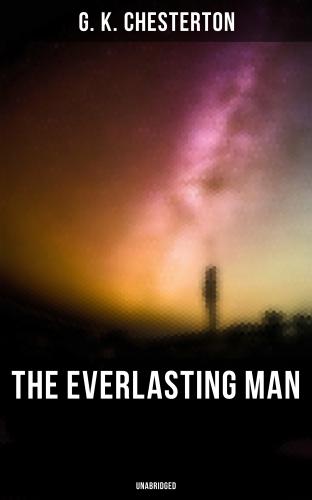G. K. Chesterton
The Everlasting Man
(Unabridged)
Published by
Books
- Advanced Digital Solutions & High-Quality eBook Formatting -
2018 OK Publishing
ISBN 978-80-272-4760-8
Table of Contents
Introduction: The Plan of This Book
Part I: On the Creature Called Man
Chapter 1. The Man in the Cave
Chapter 2. Professors and Prehistoric Men
Chapter 3. The Antiquity of Civilisation
Chapter 4. God and Comparative Religion
Chapter 5. Man and Mythologies
Chapter 6. Demons and Philosophers
Chapter 7. The War of the Gods and Demons
Chapter 8. The End of the World
Part II: On the Man Called Christ
Chapter 1. The God in the Cave
Chapter 2. The Riddles of the Gospel
Chapter 3. The Strangest Story in the World
Chapter 4. The Witness of the Heretics
Chapter 5. The Escape from Paganism
Chapter 6. The Five Deaths of the Faith
Conclusion: The Summary of this Book
Preface
This book needs a preliminary note that its scope be not misunderstood. The view suggested is historical rather than theological, and does not deal directly with a religious change which has been the chief event of my own life; and about which I am already writing a more purely controversial volume. It is impossible, I hope, for any Catholic to write any book on any subject, above all this subject, without showing that he is a Catholic; but this study is not specially concerned with the differences between a Catholic and a Protestant. Much of it is devoted to many sorts of Pagans rather than any sort of Christians; and its thesis is that those who say that Christ stands side by side with similar myths, and his religion side by side with similar religions, are only repeating a very stale formula contradicted by a very striking fact. To suggest this I have not needed to go much beyond matters known to us all; I make no claim to learning; and have to depend for some things, as has rather become the fashion, on those who are more learned. As I have more than once differed from Mr. H. G. Wells in his view of history, it is the more right that I should here congratulate him on the courage and constructive imagination which carried through his vast and varied and intensely interesting work; but still more on having asserted the reasonable right of the amateur to do what he can with the facts which the specialists provide.
Introduction:
The Plan of This Book
There are two ways of getting home; and one of them is to stay there. The other is to walk round the whole world till we come back to the same place; and I tried to trace such a journey in a story I once wrote [Manalive]. It is, however, a relief to turn from that topic to another story that I never wrote. Like every book I never wrote, it is by far the best book I have ever written. It is only too probable that I shall never write it, so I will use it symbolically here; for it was a symbol of the same truth. I conceived it as a romance of those vast valleys with sloping sides, like those along which the ancient White Horses of Wessex are scrawled along the flanks of the hills. It concerned some boy whose farm or cottage stood on such a slope, and who went on his travels to find something, such as the effigy and grave of some giant; and when he was far enough from home he looked back and saw that his own farm and kitchen-garden, shining flat on the hill-side like the colours and quarterings of a shield, were but parts of some such gigantic figure, on which he had always lived, but which was too large and too close to be seen. That, I think, is a true picture of the progress of any really independent intelligence today; and that is the point of this book.
The point of this book, in other words, is that the next best thing to being really inside Christendom is to be really outside it. And a particular point of it is that the popular critics of Christianity are not really outside it. They are on a debatable ground, in every sense of the term. They are doubtful in their very doubts. Their criticism has taken on a curious tone; as of a random and illiterate heckling. Thus they make current and anti-clerical cant as a sort of small-talk. They will complain of parsons dressing like parsons; as if we should be any more free if all the police who shadowed or collared us were plain clothes detectives. Or they will complain that a sermon cannot be interrupted, and call a pulpit a coward’s castle; though they do not call an editor’s office a coward’s castle. It would be unjust both to journalists and priests; but it would be much truer of journalist[s]. The clergyman appears in person and could easily be kicked as he came out of church; the journalist conceals even his name so that nobody can kick him. They write wild and pointless articles and letters in the press about why the churches are empty, without even going there to find out if they are empty, or which of them are empty. Their suggestions are more vapid and vacant than the most insipid curate in a three-act farce, and move us to comfort him after the manner of the curate in the Bab
